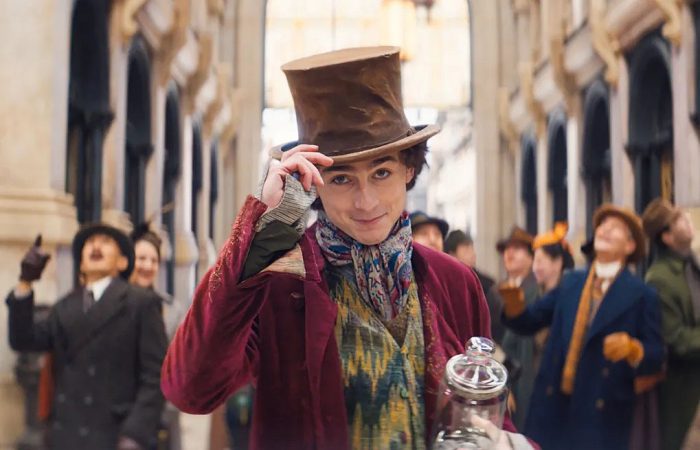Movie Review: Timothée Chalamet tackles role of titular chocolatier in ‘Wonka’
Reviewed by Jeffrey Sanzel
Among British author Roald Dahl’s best-known children’s novels are James and the Giant Peach, The Witches, Matilda, and Fantastic Mr. Fox. The hilarious but macabre tales garnered controversy for their darkness and violence, as well as racist and sexist bents. However, his work remains popular, with many stage and screen adaptations. Published in 1964, his ninth and most popular book, Charlie and the Chocolate Factory, followed a poor London boy, Charlie Bucket, and his venture in Willy Wonka’s chocolate factory. To date, over twenty million copies have been sold in fifty-five different languages. Charlie and the Chocolate Factory takes its place with classics such as Alice’s Adventures in Wonderland, The Wind in the Willows, and The Lion, the Witch, and the Wardrobe.
While Dahl vocally disliked the 1971 Willy Wonka and the Chocolate Factory, it remains a visually clever, entertaining, and original film. Gene Wilder’s enigmatic, eccentric, and underplayed Wonka contrasts smartly with Jack Albertson’s likably gruff Grandpa Joe and a group of excellent child actors supported by equally strong adults. The film does not ignore Dahl’s vision that children can be selfish and often reprehensible. Tim Burton’s divisive and polarizing 2005 Charlie and the Chocolate Factory claimed to return to the Dahl’s original. But the unpleasant film was hampered by John August’s shrill script and Johnny Depp’s disturbing Michael Jackson-like Wonka.
Sam Mendes directed the stage musical Charlie and the Chocolate Factory in London’s West End, which ran for over three and a half years. However, the Broadway transfer barely eked out nine months.
The prequel Wonka offers a technicolor glimpse into the early life of the inventor. Director Paul King (best known for the popular Paddington and Paddington 2 films) co-wrote the screenplay with Simon Farnaby. With a potential for a rich and exciting story, King and Farnaby deliver a pedestrian, often tedious, and surprisingly bland prequel.

Opening with the strains of Leslie Bricusse and Anthony Newley’s “Pure Imagination,” Willy Wonka (Timothée Chalamet) boisterously arrives in an unnamed European city. The magician-inventor-chocolatier aims to open a candy shop at the Galeries Gourmet. Quickly, the city bilks the eager youth of his pocketful of sovereigns. Additionally, he comes up against the city’s Chocolate Cartel: Arthur Slugworth (Paterson Joseph), Gerald Prodnose (Matt Lucas), and Felix Ficklegruber (Mathew Baynton).
Broke, with no place to sleep, the brutish Bleacher (Tom Davis) guides Wonka to a boarding house run by the sly Mrs. Scrubitt (Olivia Coleman). Ignoring the fine print, Wonka signs a one-night contract that sentences the boy to work in Scrubitt’s prison-like laundry. There he meets other victims of the Scrubitt and Bleacher plot: orphan Noodle (Calah Lane), Abacus Crunch (Downton Abbey’s Jim Carter), plumber Piper Benz (Natasha Rothwell), switchboard operator Lottie Bell (Rakhee Thakrar), and failed standup comedian Larry Chucklesworth (Rich Fulcher).
With Noodle’s support, Wonka hatches a scheme to sell illicit chocolate around the city, using the sewers as a means and mode. Eventually, the Cartel destroys Wonka’s legally established store on its opening day.
King and Farnaby have gathered the components of an entertaining, if by-the-numbers plot. However, rather than seeking novel inspirations, the story rehashes successful and more effective predecessors. Elements of Oliver!, Annie, Matilda, and Newsies are “borrowed.” Coleman wickedly chews the scenery, but the character is a clumsy hybrid of Miss Hannigan, Widow Corney, and even Les Misérables’ Madame Thenardier. Her cohort, Davis, is a Disney thug come to life. (Their relationship is not for the younger audience.)
Wonka’s underground team means well but is given so little development the resolutions to their stories hardly register. The Cartel is an amusing trio, but their predictable bits wear thin. Keegan-Michael Key’s chocolate-addicted chief of police becomes a running fat joke, and Rowan Atkinson’s corrupt Father Julius is just another one of his clerical buffoons. (However, the singing monks make for a clever aside.) The CGI-ed Oompa-Loompa, Lofty, allows Hugh Grant to display his wonderfully wry style. Still, the Oompa-Loompa subplot barely registers and contradicts most of the known Dahl mythology of the diminutive tribe.
And it is perhaps here where Wonka fails strongly: it lacks the flavor of Dahl’s brilliant, distinctly edgy, and wildly unpredictable world. Nothing separates the film from dozens of children’s movies that build to a caper ending (here, replete with a giraffe and flamingos). Neil Hannon’s original songs offer ersatz melodies and dull lyrics. (Clearly, King and Farnaby were not unaware of this: they use “Pure Imagination” as a finale and have even brought back the Oompa-Loompa song with new lyrics.) Even the visuals seem strangely muted.
As for Wonka’s center, Chalamet is not without charm, but his performance is nothing mercurial or unexpected. The spark that will catch fire to the later Wonka is absent. Whether he is miscast or it is a failure of the material itself (most likely a combination), Wonka must be more than just likable. He must be “more than.” And Chalamet, for all his warmth, is not Wonka.
The creators had an opportunity to give insight into one of the most intriguing icons of twentieth-century children’s literature and produce a bright, thrilling odyssey. While Wonka could have soared as Mary Poppins, it instead lands with the thud of Chitty Chitty Bang Bang.
Rated PG, Wonka is now playing in local theaters.







